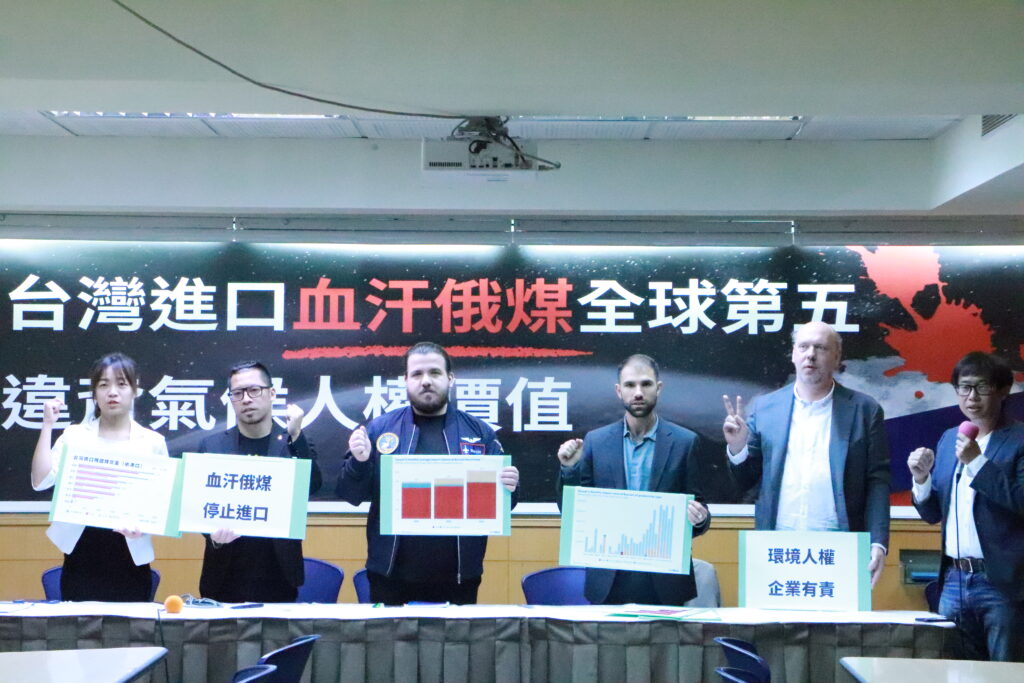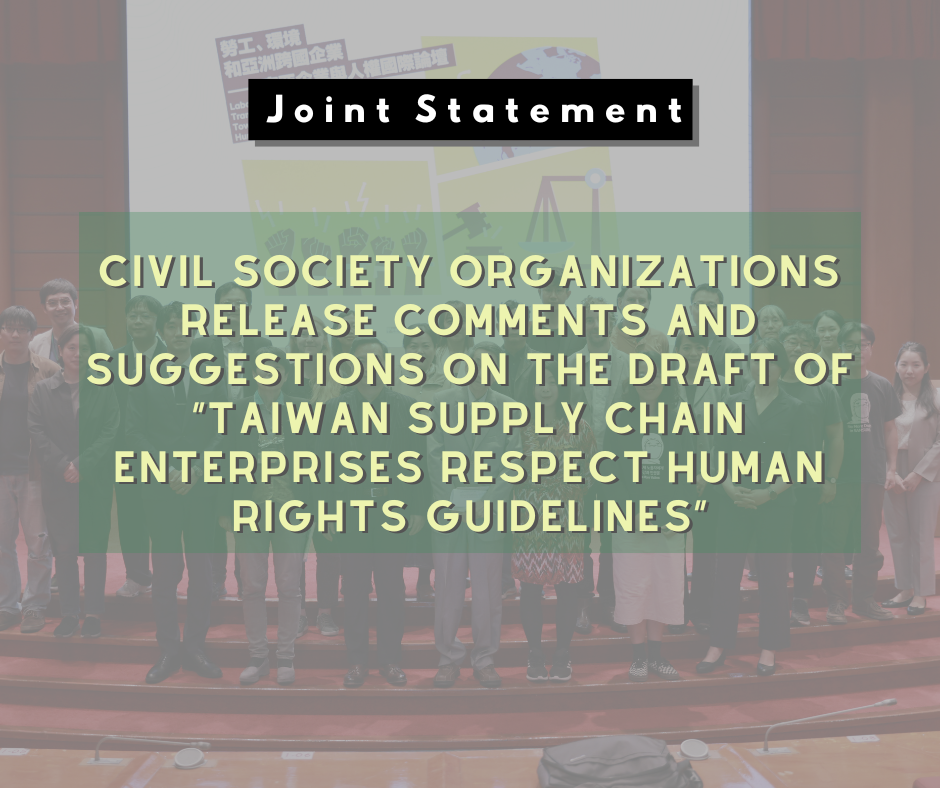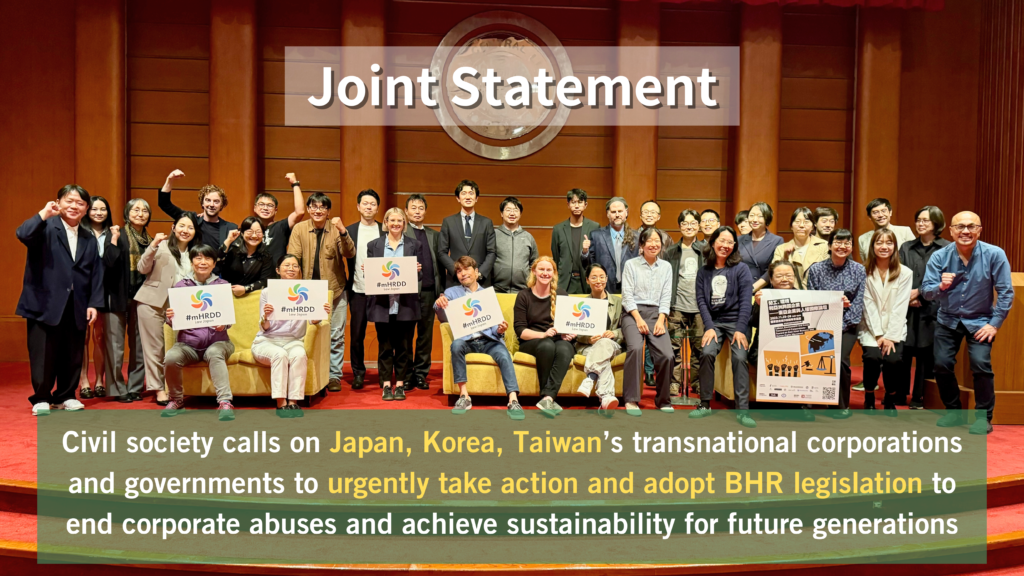Taiwan is the world’s fifth-largest importer of Russian coal, violating human right and exacerbating climate crisis
Environmental Rights Foundation, Amnesty International Taiwan, European Values Centre for Security Policy, and Taiwan Transnational Corporations Watch (TTNC Watch) held a press conference on Friday, June 21, urging the government to investigate the situation of Taiwanese companies importing Russian coal and provide them assistance to gradually cease imports. At the same time, they called on Taiwan Power Company (Taipower) to undertake human rights and environmental due diligence to stop working with or purchasing from businesses that continue to import Russian coal.
Vladimir Slivyak, founder of the Russian environmental organization Ecodefense and 2021 winner of the Right livelihood Award (also known as Alternative Nobel), remarked that the war in Ukraine, now extending beyond two years, has resulted in tens of thousands of innocent Ukrainian deaths and has forced countless others to live in constant fear and danger. He emphasised that opposing Russian aggression and authoritarianism is a duty that democratic nations around the globe cannot ignore.
Vladimir Slivyak highlighted that fossil fuels are a key economic support for Russia’s authoritarian regime and its acts of aggression. This is why, after Putin’s full-scale invasion in 2022, European countries and the United States swiftly enacted bans on importing Russian fossil fuels. Despite this, Taiwanese companies continue to purchase coal from Russia. These ongoing purchases effectively finance the dictator’s war of aggression, exacerbating the suffering of the Ukrainian people.
Furthermore, most of Russia’s coal mines are located in the Kuzbass region, where coal mining severely infringes on the health rights of local residents and environmental rights. Therefore, continuing to import Russian coal causes significant harm to human rights, the environment, and the climate. Vladimir Slivyak added that the Formosa Plastics Group is currently one of the main buyers in Taiwan. However, when he attended the Formosa Plastics shareholders’ meeting yesterday and suggested that the group stop purchasing Russian coal, there was no response from them.
Isaac Levi, Europe-Russia Policy & Energy Analysis Team Lead at the Centre for Research on Energy and Clean Air (CREA), said that Taiwan has become the fifth-largest importer of Russian coal globally since Putin’s full-scale invasion of Ukraine, buying 5% of Russia’s total coal exports. Isaac Levi said that Taiwan purchased USD 3.5 bn of Russian coal since Russia’s full-scale invasion of Ukraine, making it the second biggest buyer of Russian coal per capita globally, with the average citizen in Taiwan purchasing USD147 per person.
Isaac Levi added that over the past year, the volume of Russian coal imported by Taiwanese companies has continued to grow, increasing dependence on Russian coal from 12% in 2022 to 18% in 2024. From an energy security angle, Isaac Levi added, it is essential that Taiwan reduces its reliance on energy sources from one seller to avoid the threat of spikes in prices and supply issues. Any dependence on Russia comes with the inherent risk that supplies and therefore prices are vulnerable to decisions made by those in the Kremlin. As seen in Europe’s case, when Russia cut flows of pipeline gas — household gas prices rose by 200%.
Isaac Levi added that Taiwan Power Company (Taipower) was originally one of Taiwan’s largest buyers of Russian coal. However, since September 2022, Taipower has not purchased any Russian coal. Despite this, over the past 12 months, Taiwan’s imports of Russian coal have increased by 31% due to increased procurement by private companies. The purchases by private companies have offset Taipower’s decision to stop buying. Isaac Levi called on all Taiwanese companies to cease buying Russian coal and to provide specific plans and timelines to achieve this and for global shareholders and investors to review. He also called on the Taiwanese government to take more proactive measures to reduce private
Marcin Jerzewski, Head of the Taiwan Office of the European Values Center for Security Policy, said that Taiwan has been able to strengthen its informal albeit substantial relations with European countries, particularly in Central Eastern Europe, as the security and prosperity of the Euro-Atlantic and Indo-Pacific theaters are increasingly intertwined. One of the shared concerns of these like-minded partners is the ongoing Russian full-scale invasion in Ukraine, bolstered by the growing confluence of strategic interests between Moscow and Beijing.
Marcin Jerzewski said that as Taipei recognizes that Russian atrocities in Ukraine have implications also for its own security outlook, the government and the people of Taiwan sought to actively support the Ukrainian fight. At the same time, there is considerable evidence that Taiwan continues to engage economically with Russia, in spite of the government’s commitment to supporting the international sanctions regime. Taiwanese companies were named as one of Moscow’s major sources of machine-making tools, while Russia continues to export energy supplies to the island country. Politicians in Lithuania and Czechia, among others, have called out Taiwan for failing to act decisively and comprehensively against sanctions evasion. Taiwan’s continued business dealings with Russia could potentially harm Taiwan-Europe relations.
Amnesty International Taiwan’s Policy and Advocacy Supervisor, Cheetah Liu-Lee, stated, “The Amnesty International Report 2023/2024 highlights Russia’s critically insufficient emissions targets, policies, and finance provisions as a leading producer and exporter of fossil fuels.” Cheetah Liu-Lee emphasized that Russia not only fails to mitigate environmental impacts at existing mines but also plans to significantly increase coal and natural gas production and exports. He stressed that reducing coal procurement and use is essential for Taiwan to achieve net-zero emissions, and this responsibility falls on both the government and businesses. From the standpoint of addressing the climate crisis and defending human rights, Taiwan must prioritize the climate and human rights risks associated with Russian coal.
Environmental Rights Foundation Researcher Hsin Hsuan Sun pointed out that, according to Kpler’s data, Taiwan imported approximately 11.05 million tonnes of Russian coal from January 2023 to April this year. In terms of unloading ports, the Kaohsiung area had the highest unloading volume in Taiwan, with at least 2.7 million tonnes, followed by Mailiao Port (approximately 2.52 million tonnes) and Taipei Port (about 1.78 million tonnes). Heping Port ranked fifth in Taiwan, with an unloading volume of around 1.45 million tonnes.
As of April 2024, Mailiao Port has risen to the top in unloading volume in Taiwan, with approximately 1.08 million tonnes. The ports of Mailiao and Heping are operated and used solely by Formosa Plastics and Taiwan Cement. Their latest annual reports also confirm the procurement of coal from Russia. It is unclear, however, the buyers of coal unloaded at other ports, pending further investigation and disclosure.
Additionally, according to Formosa Plastics’ 2022 annual report and Taiwan Cement’s 2023 annual report, both companies have cooperated with Russian suppliers named by UK and US sanctions, such as Suek, Blacksand, and Kru. Continuing these partnerships poses a high risk of being affected by relevant international sanctions.
Hsin Hsuan Sun said that the stalemate in the Russia-Ukraine war shows no signs of abating, and future sanctions by the global democratic alliance against Russia will only continue to escalate. If Taiwan continues to purchase large quantities of Russian coal, it not only contravenes its international responsibility to defend human rights and democracy but also perpetuates its dependence on Russian coal. This further exposes Taiwan’s energy security to significant geopolitical and climate risks. As the authority overseeing businesses, the Ministry of Economic Affairs should immediately take the following actions.
- Conduct a thorough investigation into the overall situation of Taiwanese companies purchasing coal from Russia, regularly publish the findings and outcomes of these investigations, and actively promote and assist companies in stopping their purchases. For companies such as Formosa Plastics and Taiwan Cement that have been confirmed to import Russian coal, actively guide them in proposing specific timelines and pathways to cease their purchases. At the same time, provide more assistance and guidance to other Taiwanese companies that have not clearly disclosed their purchases and are relatively lacking in resources to mitigate the risks associated with Russian coal.
- Investigate whether Taiwanese companies have business partnerships with entities sanctioned by the US and Europe, such as SUEK and Kuzbassrazrezugol, and disclose the results of the investigation.
- In accordance with Article 5 of the Trade Act, coordinate with relevant agencies and submit a proposal to the Executive Yuan to prohibit or control the purchase of Russian coal.
Additionally, Taiwan Power Company should implement due diligence investigations to assess the situation of electricity suppliers purchasing Russian coal. For those still buying Russian coal, Taiwan Power Company should actively intervene and coordinate. If coordination proves ineffective, the company should consider terminating contracts.
Organizers: Environmental Rights Foundation, Amnesty International Taiwan, European Values Center for Security Policy, Taiwan Transnational Corporation Watch
Media contact: Hsin Hsuan Sun, Researcher & Campaigner, Environmental Rights Foundation



